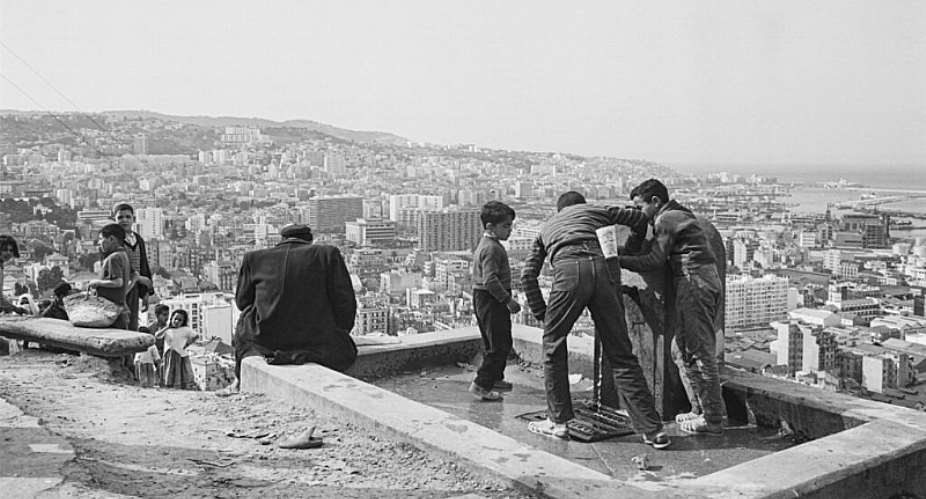A commission of French and Algerian historians created to reconcile colonial difficulties has agreed proposals for the exchange of archives, remains and artefacts. It is hoped the 10-member body – set up in August 2022 by presidents Emmanuel Macron and Abdelmadjid Tebboune – will help the countries turn the page on a shared and painful past.
RFI spoke with commission co-chair Benjamin Stora, who hopes France will this year be able to return highly symbolic records to Algeria.
RFI: Algerian historians are demanding that France return its archives. You prefer to focus on allowing free access to those archives. Can you explain the difference?
Benjamin Stora: There's a new element in relation to the old problem of restitution and that is the digital revolution. These days requests for restitution are much less important than those for the digitisation, transfer and sharing of archives.
This does not prevent the restitution of authentic documents that have symbolic value – for example the Tafna treaty of 1836 to 1837. Handwritten documents from Emir Abdelkader recorded certain reflections relating to the Muslim religion in personal notebooks.
RFI: Should the question of returning symbolic goods that belonged to Algerian resistance leaders in the 19th century – such as Ahmed Bey and Emir Abdelkader – go through the French parliament?
BS: While waiting for French political parties to agree on the restitution of property – which is far from the case – we can still put forward proposals for restitution, and not just for Algeria. The problem of restitution concerns the whole of Africa.
RFI: During in your career you have been attacked several times by the French far right. Do you fear the restitution law (which has been partially passed) will cause controversy in the National Assembly?
BS: Obviously the French far-right has been opposed to any desire for rapprochement and reconciliation for a very long time. For them any work on colonial history is part of a so-called "question of repentance". But it has absolutely nothing to do about repentance ... it's simply a matter of looking history in the face.
- New legislation opens door for French museums to return ancestral human remains
- 1961 - Algerians massacred on Paris streets
When I submitted my report to the president in January 2021, there were very harsh attacks from the French far right, which wants no exchange with Algeria on any level. The policy of the extreme right – which does not recognise colonial history – can only harm France's interests throughout Africa, particularly among young people.
RFI: For the past year you focused on the 19th century – a distant era. Is this because France and Algeria are learning to work together on a less sensitive period than that of the Algerian War of Independence?
BS: Don't be fooled into thinking the 19th century was not a sensitive period. When we explore it, we realise the Algerian population was decreasing. You see what that implies in a war of conquest. It risks awakening discussion in France on the colonial question, which is very close to us. Identity and dispossession are burning questions.
RFI: When you tackle the 20th century – in particular the Algerian War and questions regarding the nuclear and chemical tests carried out by France in the Sahara – won't the conversation become even harder?
BS: There will always be sticking points, but we must start this story from the beginning and not the end. If we do not know Algeria's history in depth, it will be difficult to deal with the end of the story – and that is the time of the war of independence itself. We must not put the cart before the horse every time. I believe that historical work is a long-term job. We have to get on with it and we have to learn to work together.
RFI: So the 20th century will be tackled, even though it still brings a lot of pain and suffering today?
BS: Of course. I have written around 30 books on the history of the Algerian War, so I've been working on it for a very long time.
This interview has been translated from French and edited for clarity.





 We saved $57.9million from procurement of new verification devices, registration...
We saved $57.9million from procurement of new verification devices, registration...
 Ejisu by-election: Aduomi is a betrayer – Ahiagbah
Ejisu by-election: Aduomi is a betrayer – Ahiagbah
 Dumsor: I’ll be in police custody if I speak, I vex — DKB
Dumsor: I’ll be in police custody if I speak, I vex — DKB
 We'll give daily evidence of Akufo-Addo's supervised thievery from our next gene...
We'll give daily evidence of Akufo-Addo's supervised thievery from our next gene...
 Asiedu Nketia crying because they've shared the positions and left him and his p...
Asiedu Nketia crying because they've shared the positions and left him and his p...
 Mahama's agenda in his next 4-year term will be 'loot and share' — Koku Anyidoho
Mahama's agenda in his next 4-year term will be 'loot and share' — Koku Anyidoho
 If you're president and you can't take care of your wife then you're not worth y...
If you're president and you can't take care of your wife then you're not worth y...
 Foreign Ministry caution Ghanaians against traveling to Northern Mali
Foreign Ministry caution Ghanaians against traveling to Northern Mali
 GHS warns public against misuse of naphthalene balls, it causes newborn jaundice
GHS warns public against misuse of naphthalene balls, it causes newborn jaundice
 Our education style contributes to unemployment - High Skies College President
Our education style contributes to unemployment - High Skies College President
